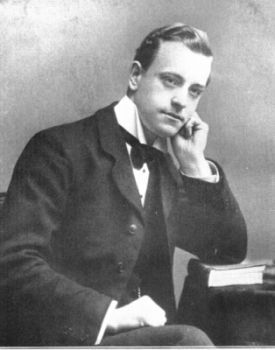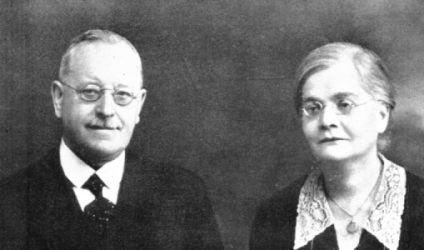Past Missionaries
Ernest Booth
Mr Ernest Booth spent thirty-one years serving the Lord in India. Mr Booth was born and bred Londoner. He was a born in Stoke Newington in 1873. He was brought up in a Christian home and his family went to a church in Forest Road, Dalston. After coming to know the Lord as his own personal saviour Mr Booth attended Homerton Row Baptist Chapel and was baptised. From then on Mr Booth stayed committed to Homerton Row Baptist Chapel until his death and was a hard worker in the church.
It was on November 19th, 1894 that Mr Booth felt he was being called to serve the Lord in India. A special day of prayer was held at Soho Chapel beginning at eight o'clock in the morning and finishing at eight o'clock in the evening. In the Jubilee report of the Strict Baptist Mission Mr Booth's feelings at the prayer meeting are recorded:
our younger brother, Mr Ernest Alfred Booth, a member of the church at homerton row ( Baptist Chapel ), offered himself as a missionary. It may be said of him, as it was of John the Baptist, but using the present tense, he is 'a burning and a shining light', enthusiastic in the work to which the Lord has evidently called him, and upon which he has entered with earnestness and zeal.
Mr Booth's call to be a missionary in India was indeed a historic moment for it was the first time that the mission sent missionaries to India to oversee the work there.
Mr Booth's dedication and farewell service took place at Keppel Street Chapel. He began the long journey to Madras on February 22nd 1895. The Jubilee Report spoke of the departure:
At 11 o'clock the special train left Liverpool Street conveying our brethren and a large contingent of friends to the Royal Albert Docks. The large company proceeded to view the vessel and take the final farewell of the dear brethren. Then as the ship slowly moved out, the hymn, 'God be with you till we meet again' was sung with melting hearts and moistened eyes'. It was a sacred moment when we committed God's dear servants to His own unerring guidance, care, and blessing. It was a struggle of nature for the godly mother of our dear brother Booth; but father and mother had but one will in the matter, and the son of their heart was but going forth to serve the Saviour of their souls, and could they say HIM nay? No! No!

Earnest Booth, 1895
Mr Booth along with Mr Hutchinson, a fellow missionary, arrived in Bombay on the 16th March. They finally made it to Madras on the 20th March.
Mr Booth was very clear is his attitude to missionary work. He was to go and 'preach the Gospel, preach the Gospel, and again preach the Gospel'. He was also very clear about making the point that workers were needed for this vast work. In conclusion to a sermon he gave at the Hill Street Baptist Chapel in London on April 26th 1899 Mr Booth said:
Let us remember His command and obey it. Go ye! But men are murdered. Go ye! But men die of fever. Go ye! But men have to live a life of self-denial. Go ye! Men are more comfortable at home. Go ye! But I would rather be at home. Go ye! Dare we say we will not go? God forbid! But linked to that command is a glorious promise: I am with you. Persecution shall come: I am with you. Loneliness shall come: I am with you. Death shall come: I am with you.
It was after hearing the plea from Mr Booth in March 1920 that David Thrower felt he should work in India. Mr Thrower joined Mr Booth as his assistant and he lived with the Booth's for some time.

Earnest and Winifred Booth
In the autumn of 1898 Mr Booth came back to Britain on furlough. During this time he married Winifred at Homerton Row Baptist Chapel.
Mrs Booth joined her husband in his work but also did much of her own work. She too was zealous and worked persistently with the Indian women. In 'Afterglow' memories of Mrs Booth she speaks about her call to the work in India:
"One Sunday Evening, early in 1900, I heard the cry of a soul in need, and the cry of a God to go and help her and that was the beginning of our work in India".
Mrs Booth set up a mission school and the Ladies Zenana work. When speaking of the Zenana work Mrs Booth spoke of one lady who feared the village god so much that she watched her son die because she felt that god was punishing her:
Our mission school had been in existence some little time in that village, and she had sent her eight-year-old boy to learn. But one-day sudden fear possessed her when the villagers told her that the gods would be avenged on her for sending her boy to a Christian school. She hurried her little boy to the little temple under the palmyras with an offering of three cocoanuts to the goddess. The cocoanuts were all bad. The days passed and the boy fell ill, and she watched him, slowly, slowly slipping away. She gave him no medicine, asked no human aid, for Shola-ammal's hand was upon him. So he dies, and darkness enclosed her, and her heart became harder than those rejected cocoanuts in the temple court. We knew not how to reason with or comfort that despairing one; but God gave us the words, and she listened.
Mr and Mrs Booth had three children. Their first son had to be brought home because of illness. They left him in Britain under the care of Mr and Mrs Caplin. They had their next two children and in 1912 they returned to find a home for them. The three children remained together and lived with a Miss Eldred in Cambridge. Mr Booth said, 'he felt to the day of her death that he owed her a debt of gratitude.'
The work Mr and Mrs Booth accomplished in India was indeed beneficial. Mr Booth devoted himself to the work for thirty-one years. Many came to know the Lord through the work and churches were established. Unfortunately ill health meant the Booth's had to return to Britain. However, Mr Booth's work for the mission did not end there. He worked as the Deputation Missionary for several years visiting churches throughout Britain to tell them of the work of SBM. He then became editor of the Herald. In the book Utmost for the Highest Mr Booth's work for the Herald is recorded:
He regarded the magazine as the most powerful means of maintaining interest, and strove to make it attractive looking, readable and inspiring. He was keen to make the little publication a live record of news from India, with the Indian atmosphere pervading its pages. 'Curry and Rice', he used to say, 'is what the readers want.'
In January 1937 Mr Booth had a stroke. He was affected by this but strove to carry on in his work until November 27th 1939 when he died peacefully in his sleep. In a diary of 1895 Mr Booth spoke of the time when he would die saying, 'Lord, when I am there, be with me, forsake me not at that solemn moment, O God of my salvation'. The God of his salvation truly was with him.
The committal took place at Barnet on November 30th 1939 and a service was held at the Soho Memorial Chapel, Finchley. A memorial service was held at Mount Zion Chapel in Chadwell Street. At this meeting David Thrower spoke about Mr Booth's work and said of how through the words of Ernest Booth he received his call to service and that eighteen years earlier he travelled for the first time to India with Mr and Mrs Booth.
On December 17th a memorial service was held in Vepery, India at the Maddox Street Chapel Mr Booth had built. The chairman spoke of Mr Booth's work in India, his connection to Homerton Row Baptist Chapel and his work for the Mission after leaving India.
Mrs Booth spoke of how she stood in her husbands study the day after he died:
The place seemed to breathe his personality. Outside - the clammy English Winter. Within - India. India in those sheaves of notes - India in those diaries - India everywhere. For his heart was always India.
Mrs Booth died on November 14th, 1942 and was also buried at Christ Church Cemetery, Barnet. She too had done so much for her Lord as she worked so hard in India. Her life was commemorated at Chadwell Street Chapel on December 9th 1942.
Together Mr and Mrs Booth had devoted their lives to serve God in India. It was God that had helped them through and they did give their all for their Saviour. Mrs Booth's plea to others to join them sums up what kept them through such hard years:
Do you say you are giving of your time, your means, your talents your opportunities, to help SBM? Well and good, but question your heart a little deeper as to whether you are giving all He asks of you personally, Jesus gave Himself for you. Is your love big enough to give yourself to His service?In 1922 the book Pictures from a Missionary's Album was published.


